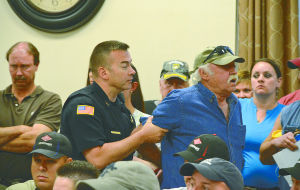Citizen kicked out of public meeting after asking board to speak louder
https://www.facebook.com/photo.php?v=697098480327636&set=o.240125856178528&type=2&theater Greene County Mayor Alan Broyles ordered police to escort a man out of a public meeting of the Greene County Industrial Development Board after the man asked the board to "speak up" so members of the audience could hear. The man, reported to be Eddie Bruce Overholt on the Save the Nolichucky Facebook page, made his request right after Broyles, the chairman of the board, told the audience, "If we have any more outbursts from the audience, you will be removed from the building." Police escorted the man out and said he was being arrested for disrupting a public meeting. The meeting concerned the re-application to Tennessee Department of [...]

